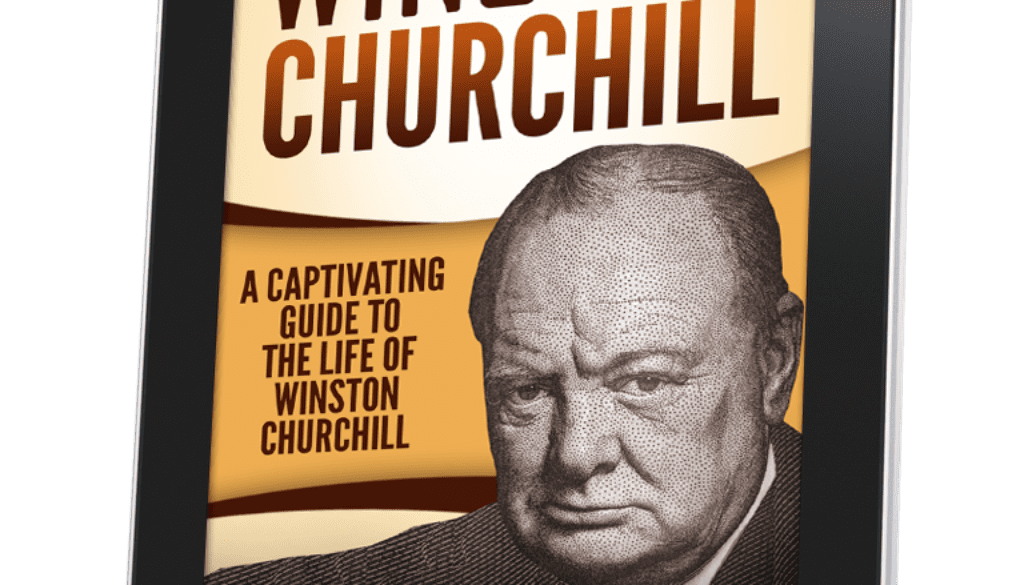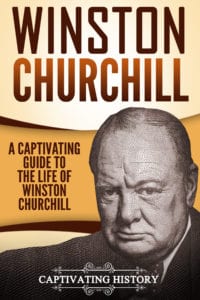Winston Churchill’s Childhood and Early Education
Winston Leonard Spencer-Churchill was born on November 30, 1874, at Blenheim Palace in Oxfordshire, England, into the influential and aristocratic family of the Dukes of Marlborough, a branch of the Spencer-Churchill family, in the closely knit inner circle of Victorian society. Winston S. Churchill’s father, Lord Randolph Churchill, was a direct descendent of John Churchill, the man who became first Duke of Marlborough early in the eighteenth century after fighting for king and country against Louis XIV of France during the War of Spanish Succession. In light of John Churchill’s deeds, parliament granted him the money to build a family seat, henceforth known as Blenheim Palace, which was named after his greatest victory.i Winston S. Churchill’s mother, Jennie Jerome, was born to Leonard W. Jerome, a New York financier, avid horse-racing fan,ii and partial owner of the New York Times.iii It was rather common in the late nineteenth century for British aristocrats to marry American heiresses, as the women often arrived with sizeable wealth.
Soon after Winston was born, the family moved. Churchill called Dublin, Ireland, his home from ages two to six while he lived with his grandfather who served as Viceroy of Ireland and employed Churchill’s father as his private secretary. It was here in Dublin that Winston Churchill’s little brother, Jack, was born and Churchill began the earliest stages of his education in which his governess instructed him in those noble pursuits of history, literature, writing, and mathematics.
The family traveled between homes often, moving from Ireland to the Isle of Wight off England’s southern coast to Blenheim Palace and to London. Reportedly, the relationship between Churchill’s parents took a downward turn, and his mother was absent for a large portion of his childhood. According to some reports, Jennie Churchill found solace in the company of other men, considering that her husband was syphilitic, a fact Churchill did not know until his father was near death. After he died, Jennie married twice, and both men proved unsuitable partners. In 1899, she married a man twenty years younger than herself, and after a divorce, she married again in 1917 to another man twenty years her junior. When she died in 1922, Churchill said, “All the sunshine and storm of life was over,” perfectly exemplifying the difficult and disruptive life they had lived together as mother and son.iv
As he was often separated from his parents, Churchill developed a strong and close relationship with his nanny, Mrs. Elizabeth Everest,1 to whom he fondly referred as “Old Woom” or “Woomany.” He later said, “Mrs. Everest it was who looked after me and tended all my wants.”v Their relationship grew into a close friendship as Winston S. Churchill grew older, and he was the only member of his family to visit her when he learned that she was gravely ill of peritonitis in 1895. Leaving his military duties, he brought a doctor and a nurse to her deathbed. Upon her death, Churchill arranged her funeral, provided the tombstone for her grave, and paid for its continued upkeep. “She had been my dearest and most intimate friend during the whole twenty years I had lived,” he said.vi “I shall never know such a friend again.”vii Everest had served as his comrade, nurse, and motherly figure. In a letter to his mother, Churchill wrote, “I feel very low, and I find I never realized how much old Woom meant to me.”viii He kept her memory alive, though. In his bedroom hung a picture of her until he died; as with many children of the Victorian aristocracy, Winston found a real mother figure in his nanny, rather than in his biological mother. Now, The Churchill Centre and the Churchill family keep attention to the grave of Mrs. Elizabeth Everest, making sure that Churchill’s efforts to care for his childhood nanny did not cease.ix
Growing older, Winston passed the age of in-home learning and moved toward boarding school. During his childhood education, Churchill maintained a poor academic record. He attended three schools: St. George’s School in Berkshire; Brunswick School (since renamed Stoke Brunswick School) in Hove; and Harrow School.
In 1882, as befitted his family’s wealth and social standing, Winston Churchill packed up his belongings and was shipped off to St. George’s boarding school a few weeks before his eighth birthday. Therefore, he moved from receiving education from a governess to learning from St. George’s. Regarding his early educational system, Churchill said, “It appeared that I was to go away from home for many weeks at a stretch in order to do lessons under new masters … Now it was to be all lessons.” After two years with St. George’s, Churchill transferred to The Misses Thomson’s Preparatory School. Here, he found more interest in subjects such as French, horseback riding, poetry, and swimming.x
From an early age, Winston expressed a heavy interest in military history and affairs. His earliest surviving letter comprises a military scene filled with flags, castles, and toy soldiers, which Churchill particularly loved and collected. He amassed an army of around fifteen hundred Napoleonic-era toy soldiers, which he played with often during his self-simulated battles. Therefore, it was no surprise that Churchill began his military career soon after entering Harrow Schoolxi in April of 1888. A month after starting at Harrow, he joined the Harrow Rifle Corps, which formed in 1859 as an affiliate of the Middlesex Regiment.xii An old Harrow song “Left, Right” proceeds as follows:
Young Brown he was a little boy
and barely four foot four
But his manly bosom yearned to join
the Harrow Rifle Corps.
So he went to see the Sergeant
and he made a grand salute.
And he said says he, I want to be
a volunteer recruit.
Winston Churchill began developing military skills—riding, gunmanship, and fencing—here at Harrow. Churchill especially loved the days when the Corps held “field days,” or mock battles when he was able to put his mind and mettle to the test. In 1892, Churchill won the Public Schools Championship for his excellence in these fields.xiii
Although Churchill excelled in the military aspect of his education, he did not particularly exceed in other areas right away. Speaking of his Harrow Latin entrance exam, Churchill recalled, “I wrote my name at the top of the page. I wrote down the number of the question, ‘1.’ After much reflection I put a bracket around it, thus, ‘(1).’ But thereafter I could not think of anything connected with it that was either relevant or true. Incidentally, there arrived from nowhere in particular a blot and several smudges. I gazed for two whole hours at this sad spectacle; and then merciful ushers collected up my piece of foolscap and carried it up to the Headmaster’s table.”xiv
He entered Harrow with low expectations, a stutter, and a lisp, yet he never let these obstacles overcome his fondness for the English language.xv The master of the school, Robert Somervell, taught English in a way that appealed to Winston. Churchill wrote, “Thus, I got into my bones the essential structure of the ordinary British sentence—which is a noble thing. And when in after years my schoolfellows who had won prizes and distinctions for writing such beautiful Latin poetry had come down to common English, to earn their living or make their way, I did not feel myself at any disadvantage.”xvi Despite his achievements and success in military matters, Churchill later revealed that he would have preferred to skip Harrow altogether. Churchill said, “In all the twelve years I was at school no one ever succeeded in making me write a Latin verse or learn any Greek except the alphabet.”xvii It was likely determined beforehand, though, that the child of Lord Randolph Churchill would not be turned away from Harrow, regardless of his poor exam results.
While probably not the underlying reason for his failures in school, Churchill’s strained relationship with his parents certainly did not encourage his studies. In fact, Churchill’s mother rarely visited him even though he wrote her letters, asking her to come see him at Harrow or allow him to go home.xviii In 1890, young Churchill’s mother wrote, “I had built up such hopes about you and felt so proud of you—and now all is gone … your work is an insult to your intelligence. If you would only trace out a plan of action for yourself and carry it out and be determined to do so—I am sure you could accomplish anything you wished.”xix
It was at Harrow that Churchill’s abilities as an orator grew. Although Churchill had a lateral lisp that plagued his career, the matter remains that his skills as a speaker are well-established.xx At Harrow, Churchill entered a competition in which he recited from memory 1200 lines of Lays of Ancient Rome, a long Macaulay poem.xxi
Due to Churchill’s interest in the military, his father determined that his son would join the army, and Winston Churchill accepted this instruction and set about following through with this goal. The next year, Churchill enrolled in the army class at Harrow, and he placed all his efforts in gaining entry in the Royal Military College, Sandhurst.xxii Thankfully, the army’s requirements fell at a lower rate than those for Home, Diplomatic, or Indian Civil services.xxiii Regardless of his low expectations in school, Churchill geared toward the political realm, and his career in the military helped him reach his goals. While at Harrow, he told his friend Murland Evans, “I tell you I shall be in command of the defenses in London … In the high position I shall occupy, it will fall to me to save the Capital and save the Empire.”xxiv Even at this early age, Churchill began plotting for his place as prime minister.
On his third attempt to pass the Sandhurst exam, Winston finally scored high enough to achieve entrance. After failing the second part twice, he left Harrow to study with Captain Walter James who professionally trained young men for the Sandhurst exam. Thankfully, his skills helped Churchill enter Sandhurst at age eighteen in 1893.xxv
Make sure to check out our latest book on Winston Churchill:
As of now, you can download it for free on Amazon by clicking here.
References
1 “Mrs.” was an honorary title, as Elizabeth Everest never married.
i Keegan, John. Winston Churchill. 2002.
ii Nicholas, Herbert G. “Sir Winston Churchill.” Encyclopaedia Britannica. https://www.britannica.com/biography/Winston-Churchill. Accessed 21 May 2017.
iii Keegan, John. Winston Churchill. 2002.
iv Keegan, John. Winston Churchill. 2002.
v “Winston’s Nanny.” National Churchill Museum. https://www.nationalchurchillmuseum.org/winston-churchill-nanny.html. Accessed 21 May 2017.
vi Churchill, Winston. My Early Life. 1930.
vii “Winston’s Nanny.” National Churchill Museum. https://www.nationalchurchillmuseum.org/winston-churchill-nanny.html. Accessed 21 May 2017.
viii Keegan, John. Winston Churchill. 2002.
ix “The Life of Churchill: Child.” International Churchill Society. https://www.winstonchurchill.org/the-life-of-churchill/child. Accessed 21 May 2017.
x “The Life of Churchill: School Years.” International Churchill Society. https://www.winstonchurchill.org/the-life-of-churchill/child/school-years. Accessed 21 May 2017.
xi Harrow School was founded in 1572 under a Royal Charter granted by Elizabeth I.
xii “Lt. Churchill: 4th Queen’s Own Hussars.” International Churchill Society. http://www.winstonchurchill.org/learn/biography/the-soldier/lt-churchill-4th-queens-own-hussars. Accessed 21 May 2017.
xiii “Lt. Churchill: 4th Queen’s Own Hussars.” International Churchill Society. http://www.winstonchurchill.org/learn/biography/the-soldier/lt-churchill-4th-queens-own-hussars. Accessed 21 May 2017.
xiv Churchill, Winston. My Early Life. 1930.
xv Sheldon, Michael. Young Titan: The Making of Winston Churchill. 2013.
xvi Keegan, John. Winston Churchill. 2002.
xvii Churchill, Winston. My Early Life. 1930.
xviii Jenkins, Roy. Churchill: A Biography. 2011.
xix“The Life of Churchill: Harrow School.” International Churchill Society. https://www.winstonchurchill.org/the-life-of-churchill/child/harrow. Accessed 21 May 2017.
xx “Winston Churchill: Stutterer.” University of Toronto. http://www.utstat.utoronto.ca/sharp/Churchill.htm. Accessed 21 May 2017.
xxi “The Life of Churchill: Harrow School.” International Churchill Society. https://www.winstonchurchill.org/the-life-of-churchill/child/harrow. Accessed 21 May 2017.
xxii “Lt. Churchill: 4th Queen’s Own Hussars.” International Churchill Society. http://www.winstonchurchill.org/learn/biography/the-soldier/lt-churchill-4th-queens-own-hussars. Accessed 21 May 2017.
xxiii Keegan, John. Winston Churchill. 2002.
xxiv “Lt. Churchill: 4th Queen’s Own Hussars.” International Churchill Society. http://www.winstonchurchill.org/learn/biography/the-soldier/lt-churchill-4th-queens-own-hussars. Accessed 21 May 2017.
xxv “Lt. Churchill: 4th Queen’s Own Hussars.” International Churchill Society. http://www.winstonchurchill.org/learn/biography/the-soldier/lt-churchill-4th-queens-own-hussars. Accessed 21 May 2017.

